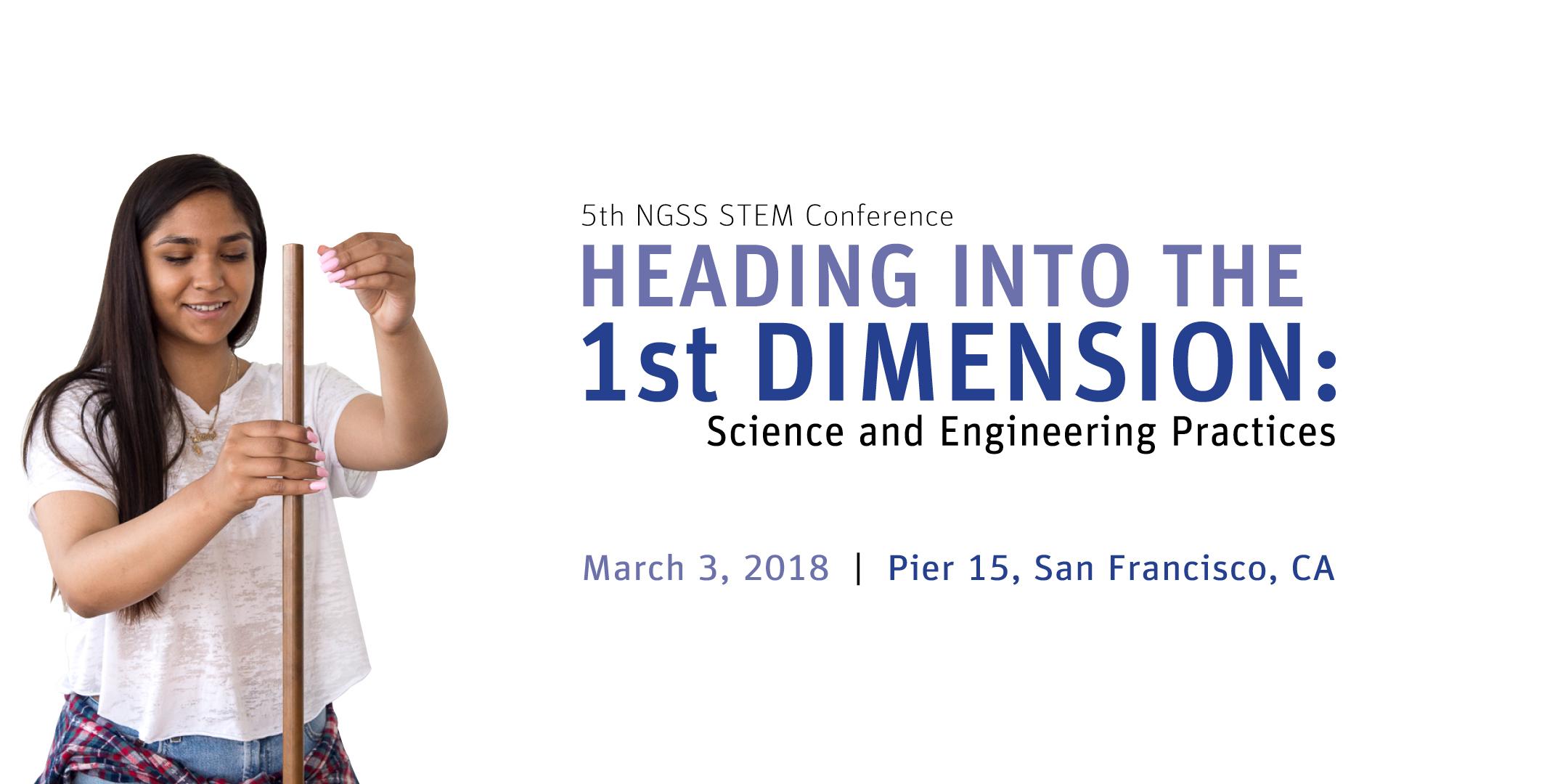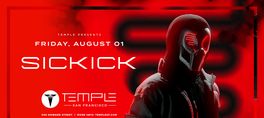Sat March 3, 2018
Heading into the 1st Dimension: Science and Engineering Practices
SEE EVENT DETAILS
The Exploratorium's Teacher Institute and Institute for Inquiry present:
Heading into the 1st Dimension: Science and Engineering Practices
Saturday, March 3, 2018 at the Exploratorium
Travel to a new dimension at our 2018 STEM Conference, Heading Into the 1st Dimension: Science and Engineering Practices. This full-day conference includes a variety of workshops designed for teachers of grades 3–12 and featuring Dimension 1 of the California Next Generation Science Standards: Science and Engineering Practices (SEPs).
The SEPs emphasize the major practices that scientists and engineers engage in as they investigate the world and design and build systems. The conference sessions will focus on engaging, hands-on activities that highlight the implementation of the SEPs in school classrooms. Presented by the Exploratorium’s Teacher Institute and the Institute for Inquiry, this full-day conference features:
a plenary session
hands-on workshops featuring activities teachers can use in their classrooms to engage students in the SEPs
Breakfast and lunch will be included, and participants will have access to all the conference handouts and activities online. One semester unit of Continuing Education credit will be available for an additional fee.
Tickets are limited, so please register early to get your first choice workshop sessions!
Do you teach at a Title 1 school? Let us know on your registration form and you’ll receive a 50% rebate on your registration fee after you attend the conference.
Workshop Sessions
We are offering eight hands-on workshops, and attendees will be able to go to three of them. After the conference, we will post activities from all of the workshops on our website.
Everyone is welcome to sign up for three workshops of their choice (first come, first served). The grade levels provided are suggestions.
Trends and Correlation in Environmental Data (grades 6-12)
What does atmospheric carbon dioxide data look like when graphed with global temperature anomalies? Using data from NOAA and NASA, we will graph different environmental data sets on the same axes, using mathematics and computational thinking to look for trends and correlations. Come graph with us!
Fabulous Fan Carts: Exploring Forces and Motion (grades 3-12)
Looking for ways to incorporate the NGSS practice of modeling into your studies of forces and motion? Wondering about new ways to bring Newton’s Laws to life for your students? In this workshop, we will use cheap and easy-to-construct fan carts and marble mazes to explore and build conceptual models about balanced and unbalanced forces, momentum, and acceleration. You’ll leave with an understanding of how we can think about motion from third grade through physics and a wealth of activities to help students construct knowledge about how and why things move.
Getting Stuck on Magnets (grades 3-12)
Help your students make mental models of one of the most mysterious and seemingly magical parts of physics: magnets. Learn to build a 3D model of how currents make magnetic fields, then use that knowledge to figure out what makes one magnet stronger than another.
Science Practice Circus (grades 3-5)
Engage in doing science practices as part of a series of hands-on activities. A video and discussion about how the science practices can be applied and facilitated in the classroom follows.
Seeing Is Believing—Or Is It? (grades 6-12)
Can you really text and drive? Think you see things clearly? Let’s see about seeing as we collect data while investigating your peripheral vision. See where the evidence leads as we engage in simple yet deep hands-on, eyes-on Snack activities. Join us as you change your view of the the science practices.
Termites and Bic Pens (grades 6-12)
What do you notice? Have you ever seen a termite? What if I told you I could train a termite? Teachers take years to design and refine the questions they pose in class, but students are rarely asked to do the same. Develop strategies for students to form their own questions after observing a phenomenon involving termites and ballpoint pens, then use those questions to plan and carry out an investigation.
Electrifying Investigations (grades 6-12)
Wondering how to have students plan and carry out investigations with limited resources? Worried about the safety of open-ended explorations in chemistry and physics? We’ll use the familiar system of batteries and lights to model how to combine the collective experiments of a scientific community to build understanding of a phenomenon.
Modeling Matter Through an Exploration of Gases (grades 6-12)
How can we provide experiences to help students understand the nature and properties of matter? Come explore how to make models of matter based on phenomena that highlight student-centered experiences. We'll experiment with gases and vacuums to build and model your students' understanding of matter.
Conference Schedule
8:30 a.m. Registration
9:00–10:00 a.m. Welcome and Plenary Session
10:15–11:45 a.m. First Session
11:45 a.m.–12:30 p.m. Lunch
12:45–2:15 p.m. Second Session
2:30–4:00 p.m. Third Session
4:00–5:00 p.m. Happy Hour (optional)
show less
Heading into the 1st Dimension: Science and Engineering Practices
Saturday, March 3, 2018 at the Exploratorium
Travel to a new dimension at our 2018 STEM Conference, Heading Into the 1st Dimension: Science and Engineering Practices. This full-day conference includes a variety of workshops designed for teachers of grades 3–12 and featuring Dimension 1 of the California Next Generation Science Standards: Science and Engineering Practices (SEPs).
The SEPs emphasize the major practices that scientists and engineers engage in as they investigate the world and design and build systems. The conference sessions will focus on engaging, hands-on activities that highlight the implementation of the SEPs in school classrooms. Presented by the Exploratorium’s Teacher Institute and the Institute for Inquiry, this full-day conference features:
a plenary session
hands-on workshops featuring activities teachers can use in their classrooms to engage students in the SEPs
Breakfast and lunch will be included, and participants will have access to all the conference handouts and activities online. One semester unit of Continuing Education credit will be available for an additional fee.
Tickets are limited, so please register early to get your first choice workshop sessions!
Do you teach at a Title 1 school? Let us know on your registration form and you’ll receive a 50% rebate on your registration fee after you attend the conference.
Workshop Sessions
We are offering eight hands-on workshops, and attendees will be able to go to three of them. After the conference, we will post activities from all of the workshops on our website.
Everyone is welcome to sign up for three workshops of their choice (first come, first served). The grade levels provided are suggestions.
Trends and Correlation in Environmental Data (grades 6-12)
What does atmospheric carbon dioxide data look like when graphed with global temperature anomalies? Using data from NOAA and NASA, we will graph different environmental data sets on the same axes, using mathematics and computational thinking to look for trends and correlations. Come graph with us!
Fabulous Fan Carts: Exploring Forces and Motion (grades 3-12)
Looking for ways to incorporate the NGSS practice of modeling into your studies of forces and motion? Wondering about new ways to bring Newton’s Laws to life for your students? In this workshop, we will use cheap and easy-to-construct fan carts and marble mazes to explore and build conceptual models about balanced and unbalanced forces, momentum, and acceleration. You’ll leave with an understanding of how we can think about motion from third grade through physics and a wealth of activities to help students construct knowledge about how and why things move.
Getting Stuck on Magnets (grades 3-12)
Help your students make mental models of one of the most mysterious and seemingly magical parts of physics: magnets. Learn to build a 3D model of how currents make magnetic fields, then use that knowledge to figure out what makes one magnet stronger than another.
Science Practice Circus (grades 3-5)
Engage in doing science practices as part of a series of hands-on activities. A video and discussion about how the science practices can be applied and facilitated in the classroom follows.
Seeing Is Believing—Or Is It? (grades 6-12)
Can you really text and drive? Think you see things clearly? Let’s see about seeing as we collect data while investigating your peripheral vision. See where the evidence leads as we engage in simple yet deep hands-on, eyes-on Snack activities. Join us as you change your view of the the science practices.
Termites and Bic Pens (grades 6-12)
What do you notice? Have you ever seen a termite? What if I told you I could train a termite? Teachers take years to design and refine the questions they pose in class, but students are rarely asked to do the same. Develop strategies for students to form their own questions after observing a phenomenon involving termites and ballpoint pens, then use those questions to plan and carry out an investigation.
Electrifying Investigations (grades 6-12)
Wondering how to have students plan and carry out investigations with limited resources? Worried about the safety of open-ended explorations in chemistry and physics? We’ll use the familiar system of batteries and lights to model how to combine the collective experiments of a scientific community to build understanding of a phenomenon.
Modeling Matter Through an Exploration of Gases (grades 6-12)
How can we provide experiences to help students understand the nature and properties of matter? Come explore how to make models of matter based on phenomena that highlight student-centered experiences. We'll experiment with gases and vacuums to build and model your students' understanding of matter.
Conference Schedule
8:30 a.m. Registration
9:00–10:00 a.m. Welcome and Plenary Session
10:15–11:45 a.m. First Session
11:45 a.m.–12:30 p.m. Lunch
12:45–2:15 p.m. Second Session
2:30–4:00 p.m. Third Session
4:00–5:00 p.m. Happy Hour (optional)
The Exploratorium's Teacher Institute and Institute for Inquiry present:
Heading into the 1st Dimension: Science and Engineering Practices
Saturday, March 3, 2018 at the Exploratorium
Travel to a new dimension at our 2018 STEM Conference, Heading Into the 1st Dimension: Science and Engineering Practices. This full-day conference includes a variety of workshops designed for teachers of grades 3–12 and featuring Dimension 1 of the California Next Generation Science Standards: Science and Engineering Practices (SEPs).
The SEPs emphasize the major practices that scientists and engineers engage in as they investigate the world and design and build systems. The conference sessions will focus on engaging, hands-on activities that highlight the implementation of the SEPs in school classrooms. Presented by the Exploratorium’s Teacher Institute and the Institute for Inquiry, this full-day conference features:
a plenary session
hands-on workshops featuring activities teachers can use in their classrooms to engage students in the SEPs
Breakfast and lunch will be included, and participants will have access to all the conference handouts and activities online. One semester unit of Continuing Education credit will be available for an additional fee.
Tickets are limited, so please register early to get your first choice workshop sessions!
Do you teach at a Title 1 school? Let us know on your registration form and you’ll receive a 50% rebate on your registration fee after you attend the conference.
Workshop Sessions
We are offering eight hands-on workshops, and attendees will be able to go to three of them. After the conference, we will post activities from all of the workshops on our website.
Everyone is welcome to sign up for three workshops of their choice (first come, first served). The grade levels provided are suggestions.
Trends and Correlation in Environmental Data (grades 6-12)
What does atmospheric carbon dioxide data look like when graphed with global temperature anomalies? Using data from NOAA and NASA, we will graph different environmental data sets on the same axes, using mathematics and computational thinking to look for trends and correlations. Come graph with us!
Fabulous Fan Carts: Exploring Forces and Motion (grades 3-12)
Looking for ways to incorporate the NGSS practice of modeling into your studies of forces and motion? Wondering about new ways to bring Newton’s Laws to life for your students? In this workshop, we will use cheap and easy-to-construct fan carts and marble mazes to explore and build conceptual models about balanced and unbalanced forces, momentum, and acceleration. You’ll leave with an understanding of how we can think about motion from third grade through physics and a wealth of activities to help students construct knowledge about how and why things move.
Getting Stuck on Magnets (grades 3-12)
Help your students make mental models of one of the most mysterious and seemingly magical parts of physics: magnets. Learn to build a 3D model of how currents make magnetic fields, then use that knowledge to figure out what makes one magnet stronger than another.
Science Practice Circus (grades 3-5)
Engage in doing science practices as part of a series of hands-on activities. A video and discussion about how the science practices can be applied and facilitated in the classroom follows.
Seeing Is Believing—Or Is It? (grades 6-12)
Can you really text and drive? Think you see things clearly? Let’s see about seeing as we collect data while investigating your peripheral vision. See where the evidence leads as we engage in simple yet deep hands-on, eyes-on Snack activities. Join us as you change your view of the the science practices.
Termites and Bic Pens (grades 6-12)
What do you notice? Have you ever seen a termite? What if I told you I could train a termite? Teachers take years to design and refine the questions they pose in class, but students are rarely asked to do the same. Develop strategies for students to form their own questions after observing a phenomenon involving termites and ballpoint pens, then use those questions to plan and carry out an investigation.
Electrifying Investigations (grades 6-12)
Wondering how to have students plan and carry out investigations with limited resources? Worried about the safety of open-ended explorations in chemistry and physics? We’ll use the familiar system of batteries and lights to model how to combine the collective experiments of a scientific community to build understanding of a phenomenon.
Modeling Matter Through an Exploration of Gases (grades 6-12)
How can we provide experiences to help students understand the nature and properties of matter? Come explore how to make models of matter based on phenomena that highlight student-centered experiences. We'll experiment with gases and vacuums to build and model your students' understanding of matter.
Conference Schedule
8:30 a.m. Registration
9:00–10:00 a.m. Welcome and Plenary Session
10:15–11:45 a.m. First Session
11:45 a.m.–12:30 p.m. Lunch
12:45–2:15 p.m. Second Session
2:30–4:00 p.m. Third Session
4:00–5:00 p.m. Happy Hour (optional)
read more
Heading into the 1st Dimension: Science and Engineering Practices
Saturday, March 3, 2018 at the Exploratorium
Travel to a new dimension at our 2018 STEM Conference, Heading Into the 1st Dimension: Science and Engineering Practices. This full-day conference includes a variety of workshops designed for teachers of grades 3–12 and featuring Dimension 1 of the California Next Generation Science Standards: Science and Engineering Practices (SEPs).
The SEPs emphasize the major practices that scientists and engineers engage in as they investigate the world and design and build systems. The conference sessions will focus on engaging, hands-on activities that highlight the implementation of the SEPs in school classrooms. Presented by the Exploratorium’s Teacher Institute and the Institute for Inquiry, this full-day conference features:
a plenary session
hands-on workshops featuring activities teachers can use in their classrooms to engage students in the SEPs
Breakfast and lunch will be included, and participants will have access to all the conference handouts and activities online. One semester unit of Continuing Education credit will be available for an additional fee.
Tickets are limited, so please register early to get your first choice workshop sessions!
Do you teach at a Title 1 school? Let us know on your registration form and you’ll receive a 50% rebate on your registration fee after you attend the conference.
Workshop Sessions
We are offering eight hands-on workshops, and attendees will be able to go to three of them. After the conference, we will post activities from all of the workshops on our website.
Everyone is welcome to sign up for three workshops of their choice (first come, first served). The grade levels provided are suggestions.
Trends and Correlation in Environmental Data (grades 6-12)
What does atmospheric carbon dioxide data look like when graphed with global temperature anomalies? Using data from NOAA and NASA, we will graph different environmental data sets on the same axes, using mathematics and computational thinking to look for trends and correlations. Come graph with us!
Fabulous Fan Carts: Exploring Forces and Motion (grades 3-12)
Looking for ways to incorporate the NGSS practice of modeling into your studies of forces and motion? Wondering about new ways to bring Newton’s Laws to life for your students? In this workshop, we will use cheap and easy-to-construct fan carts and marble mazes to explore and build conceptual models about balanced and unbalanced forces, momentum, and acceleration. You’ll leave with an understanding of how we can think about motion from third grade through physics and a wealth of activities to help students construct knowledge about how and why things move.
Getting Stuck on Magnets (grades 3-12)
Help your students make mental models of one of the most mysterious and seemingly magical parts of physics: magnets. Learn to build a 3D model of how currents make magnetic fields, then use that knowledge to figure out what makes one magnet stronger than another.
Science Practice Circus (grades 3-5)
Engage in doing science practices as part of a series of hands-on activities. A video and discussion about how the science practices can be applied and facilitated in the classroom follows.
Seeing Is Believing—Or Is It? (grades 6-12)
Can you really text and drive? Think you see things clearly? Let’s see about seeing as we collect data while investigating your peripheral vision. See where the evidence leads as we engage in simple yet deep hands-on, eyes-on Snack activities. Join us as you change your view of the the science practices.
Termites and Bic Pens (grades 6-12)
What do you notice? Have you ever seen a termite? What if I told you I could train a termite? Teachers take years to design and refine the questions they pose in class, but students are rarely asked to do the same. Develop strategies for students to form their own questions after observing a phenomenon involving termites and ballpoint pens, then use those questions to plan and carry out an investigation.
Electrifying Investigations (grades 6-12)
Wondering how to have students plan and carry out investigations with limited resources? Worried about the safety of open-ended explorations in chemistry and physics? We’ll use the familiar system of batteries and lights to model how to combine the collective experiments of a scientific community to build understanding of a phenomenon.
Modeling Matter Through an Exploration of Gases (grades 6-12)
How can we provide experiences to help students understand the nature and properties of matter? Come explore how to make models of matter based on phenomena that highlight student-centered experiences. We'll experiment with gases and vacuums to build and model your students' understanding of matter.
Conference Schedule
8:30 a.m. Registration
9:00–10:00 a.m. Welcome and Plenary Session
10:15–11:45 a.m. First Session
11:45 a.m.–12:30 p.m. Lunch
12:45–2:15 p.m. Second Session
2:30–4:00 p.m. Third Session
4:00–5:00 p.m. Happy Hour (optional)
show less
Date/Times:
Exploratorium
1 Upcoming Events
Pier 15, San Francisco, CA 94111
The Best Events
Every Week in Your Inbox
From Our Sponsors
UPCOMING EVENTS
Great suggestion! We'll be in touch.
Event reviewed successfully.









